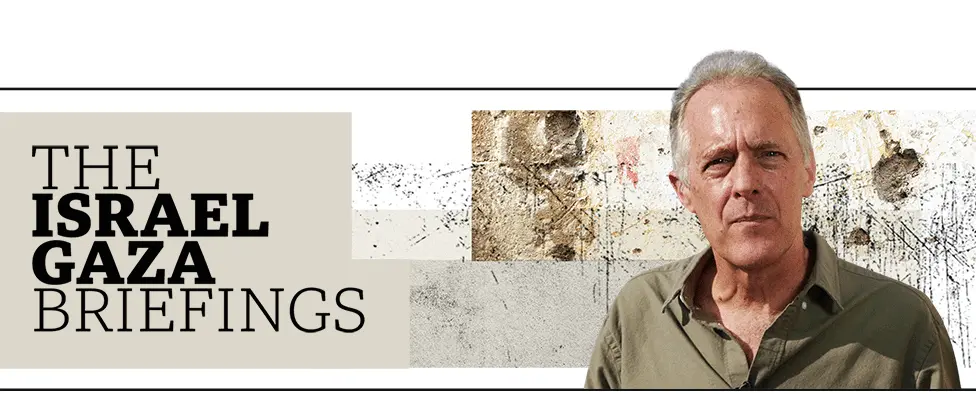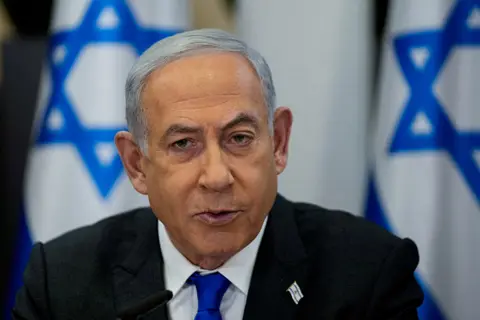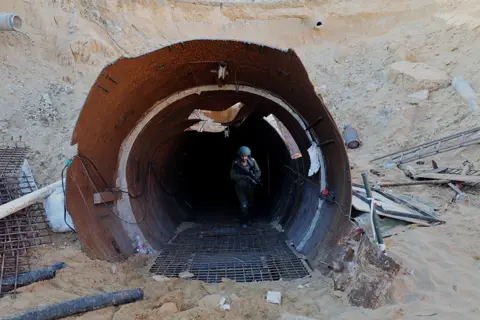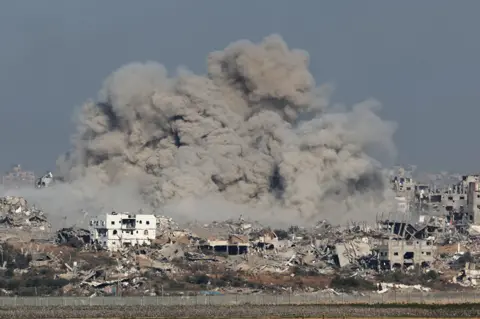Israel-Gaza war: The huge challenges facing Israel's 'day after' plan
 BBC
BBCWhen Hamas attacked Israel, almost exactly three months ago, Israel was unprepared.
It didn't see the attack coming, struggled to contain it at first and then launched a full-scale invasion of the Gaza Strip with only the bare bones of a plan: to destroy Hamas.
Beyond that, there was a yawning vacuum. But that's beginning to change.
As outlined to reporters on Thursday, Defence Minister Yoav Gallant's plan for "the day after" is little more than a series of bullet points, but they're worth examining.
On security, he doesn't really say anything Prime Minister Benjamin Netanyahu hasn't already - Israel will "reserve its operational freedom of action" throughout the Gaza Strip, and make sure that no-one poses a threat to Israel.
It's when the plan touches on what it calls "the four corners of the civilian square" that things get a little blurry.
Israel's rigid control over the entry of goods into the Gaza Strip - a fact of life for the past two decades - would continue.
 Reuters
ReutersIsrael, Egypt and the United States would work together on ways to secure the porous border between Egypt and Gaza - something that would involve solving the problem of tunnels once and for all.
But the plan envisages a major role for foreign players - the US, plus European and Arab governments - in the creation of a "multinational task force" with responsibility for what's euphemistically called "the rehabilitation of the Gaza Strip".
In other words, those countries will be expected to put the whole shattered area back together. And pay for it.
For countries, the EU and Gulf States in particular, which have seen their previous investments - hospitals, schools and universities - blown to smithereens over the past three months, it is hardly a tempting prospect.
Even assuming Israel succeeds in its goal of eliminating Hamas as a threat, who is to say violence won't erupt in the future, triggering yet another round of costly destruction?
The tireless US Secretary of State, Antony Blinken, is on his latest visit to the region - his fourth since 7 October. As he travels from one Arab capital to another, how much enthusiasm is he likely to encounter from leaders appalled at the scenes of suffering inflicted on Gaza?
Until now, the Arab view has been that until there's a ceasefire and the war's devastating humanitarian consequences have been properly addressed, it's impossible to talk about "the day after".
 AFP
AFPBut writing for the British think tank Chatham House, Dr Sanam Vakil and Dr Neil Quilliam urge Arab governments not to wait.
"Without serious regional planning and investment in Gaza," they write, "a potential outcome that could materialize is lawlessness and a Palestinian political vacuum alongside the grim reality of famine, disease and death."
And what of that "Palestinian political vacuum"?
In Mr Gallant's "four corners" plan, the Palestinian component is perhaps the vaguest.
"The entity controlling the territory," it says, "will build on the capabilities of the existing administrative mechanism (civil committees) in Gaza - local non-hostile actors."
According to media reports, all appointments to local committees would have to be approved by Israel.
There's no role for Hamas, obviously, but also none - for now at least - for the Palestinian Authority, which is based in the West Bank, and its president Mahmoud Abbas.
For Palestinians, the plan has echoes of a fleeting Israeli effort, in the late 1970s, to promote non-political "Village Leagues" to run local affairs in the occupied West Bank and Gaza Strip (and thus reduce the influence of the Palestine Liberation Organisation).
"Israel cannot conceive of an idea where Palestinians have political agency," says Amjad Iraqi, senior editor at the independent Israeli +972 Magazine.
"They're basically trying to replicate in Gaza the model they have in the West Bank, but with someone that isn't an organised political faction."
 AFP
AFPEmploying local committees composed of Gaza notables would also have the effect of politically separating the Gaza Strip from the West Bank.
Palestinians have long been wary of what they see as a deliberate Israeli policy of divide and rule, aimed in part at preventing the establishment of a viable Palestinian state.
The West Bank and Gaza may have been physically separate since the establishment of the State of Israel in 1948, but Palestinians regard both territories as integral parts of their national identity and will fiercely resist any attempt to sever that connection.
"Gaza is not a separate country," says the Palestinian analyst and former PA spokeswoman Nour Odeh. "They have the same aspirations for statehood and freedom from Israeli control and occupation."
US officials, who say they are still examining the Gallant plan (and who point out that it's not yet an official Israeli proposal) don't seem very enthusiastic.
For weeks, the Biden administration has been insisting that there should be a role for the Palestinian Authority, in the teeth of opposition from Mr Netanyahu, who argues that the PA has disqualified itself through its failure to condemn Hamas's 7 October attacks.
Travelling with Mr Blinken, a senior State Department official said the US still wanted to see the PA ruling over the Palestinian territories - meaning the West Bank and Gaza Strip.
He also said it would be hard for the US to get Arab partners to agree to work with Israel when some members of Mr Netanyahu's government were openly calling for Palestinians to be resettled outside Gaza.
This remains the biggest Palestinian fear, fuelled by fiery rhetoric from some of Mr Netanyahu's political allies and policy documents from obscure parts of the government.
In recent days, those fears have been stoked by reports that the government has been conducting secret negotiations with African countries to accept migrants from Gaza.
With a large proportion of Gaza's civilian population now crammed into the southern part of the Strip, some of them having moved multiple times since 7 October, the thought that they might be forced to seek sanctuary outside Gaza - with no certainty of being able to return - is profoundly alarming.
But it's not just the Palestinians who are sceptical about Mr Gallant's plan.
Some of the most vociferous opposition is already coming from hardline members of Mr Netanyahu's own fractious coalition.
Some of them believe it was a fundamental mistake for Israel to pull out of the Gaza Strip in 2005. The only way to guarantee security, they argue, is for Israel to reoccupy the whole area and allow Jewish settlers to return.
On this, Mr Gallant seems pretty blunt.
"There will be no Israeli civilian presence in the Gaza Strip."
But for the hardliners, rebuilding Gaza and allowing the Palestinians to stay is merely storing up trouble.
"We will go back to October the 7th, maybe in two years, five years, 10 years," says Ohad Tal, an MP from the hardline Religious Zionist Party.
"Allowing money from the world to flood into Gaza to rebuild the houses basically means they will take all the money and as before, instead of building Gaza into a Singapore, they made it into the biggest terror nest in the world."
The widely reported bust up in Thursday night's cabinet meeting, over the separate but related matter of when and how the Israeli military should examine the circumstances surrounding the 7 October attacks, was a powerful demonstration of the sharp divisions within Mr Netanyahu's government.
Those divisions are only likely to deepen as Israel - and the world - grapple with what to do with Gaza when this war finally ends.

